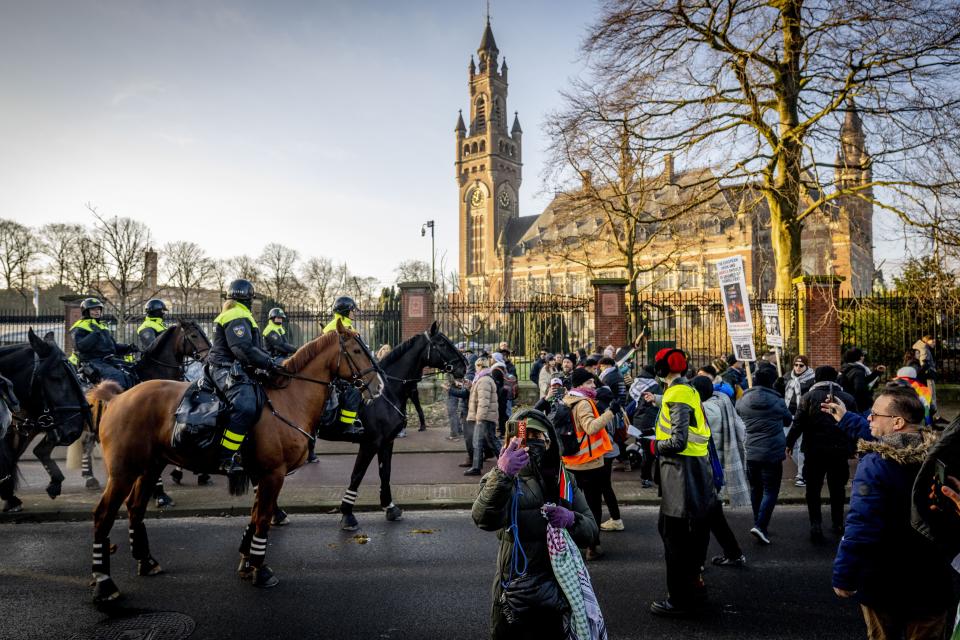International Court of Justice orders Israel to take steps to prevent Gaza death and destruction
The U.N.'s top court Friday ordered Israel to take measures to limit death and destruction in Gaza as part of a case brought by South Africa alleging that Israel’s military action in its war with Hamas amounts to genocide.
The court stopped short of ordering a cease-fire in Gaza, which South Africa had requested.
The order from the International Court of Justice, which is based in the Hague, Netherlands, is the first step in a wider case about whether Israel is committing genocide against Palestinians in Gaza. But it is unlikely to have an immediate impact on the war, which Israel has vowed it will press ahead on until it destroys Hamas and secures the release of the hostages that were taken in the Oct. 7 attacks.

Netanyahu: 'We will continue to do what is necessary'
"We will continue to do what is necessary to defend our country and defend our people," Israeli Prime Minister Benjamin Netanyahu said after the ruling.
Israel had already rejected the genocide allegations when it testified before the court in early January and Netanyahu stressed after the ruling that his country has the right to defend itself. "The charge of genocide leveled against Israel is not only false, it’s outrageous, and decent people everywhere should reject it."
A verdict on South Africa's claim that Israel is guilty of genocide in Gaza is expected to take several years.
Palestinian Minister of Foreign Affairs Riyadh Maliki "welcomed" the international court's order and said it was an important reminder that no state is above the law or beyond the reach of justice.
A war with no walls: Inside the devastating impact of Israel-Hamas war around the globe
The international court's order from a panel of 17 judges is an advisory opinion that is not enforceable by the court. However, it is still significant because it adds political pressure on Israel to work toward a cease-fire in Gaza almost four months since the start of its retaliatory military campaign against Hamas for its Oct. 7 attacks.
"The court is acutely aware of the extent of the human tragedy that is unfolding in the region and is deeply concerned about the continuing loss of life and human suffering,” said Joan E. Donoghue, the court's president.
Donoghue ordered Israel to submit a report to the court within one month on the actions it has taken to prevent any acts in Gaza that could be considered genocidal, such as killing members of a group; imposing conditions that could prevent women from giving birth; and preventing and punishing public comments that incite genocide. The court ordered Israel to make sure sufficient humanitarian aid was getting into Gaza.
According to the Hamas-run health ministry in Gaza, Israel's military has killed more than 26,000 Palestinians, the majority of them women and children. Hamas' attack on Israel killed more than 1,200 people, mainly civilians. Hamas also took about 250 hostages back to Gaza. An estimated 100 Israelis remain in captivity.
The U.N.'s Genocide Convention of 1948 codified it as a crime that is, though open to interpretation, defined as "acts committed with intent to destroy, in whole or in part, a national, ethnical, racial or religious group."
Chilling details of what hostages faced: 'We know they were raped in Hamas captivity'
One of South Africa's arguments for accusing Israel's actions in Gaza of being "genocidal in character" is the public statements by Israel's own leaders and lawmakers. In October, Defense Minister Yoav Gallant said Israel was fighting "human animals" in Gaza and would impose a "complete siege" on the territory.
Lawyers for Israel deny that accusation, saying the country has tried to avoid civilian casualties and also sought to increase deliveries of humanitarian aid to Gaza after they were temporarily stopped at the start of the war.
Israel’s military campaign has driven nearly 85% of Gaza’s population of 2.3 million from their homes, according to the U.N. Much of northern Gaza, including Gaza City, has been reduced to rubble. At least one-quarter of Gaza's population is facing starvation, according to the U.N. and humanitarian aid groups.
Marko Milanovic, a professor of international law at the University of Reading, in England, said that the "intent of the perpetrator is the defining characteristic of genocide."
He said that even though Israel has killed more than 26,000 people, the killing of those people could be "legal" in terms of being fully compliant with international humanitarian law. It could also be, he said, "illegal," and reflect a different type of war crime, such as crimes against humanity, which is typically defined as acts committed as part of a widespread or systematic attack against civilians.
"It could be genocide ? if you can prove that genocidal intent," he said.
He's digging for water on the Moon: He hasn't been able to find a way to get water to Gaza
South Africa strongly supports the Palestinians. The African National Congress, the country's governing political party, has long compared Israel’s policies in Gaza and the West Bank to its own history under its apartheid regime of white minority rule, when there was racial segregation and institutionalized discrimination. It lasted until 1994.
South Africa was one of the first countries to describe Israel's military occupation of Palestinian lands as apartheid, a label Israel vehemently rejects. There is a 20-foot bronze statue of South Africa's anti-apartheid icon Nelson Mandela in a park in the heart of Ramallah, the Palestinian administrative capital in the West Bank.
In March 2022 the international court ordered Russia to halt its invasion of Ukraine. Russia did not comply.
War crimes in Ukraine: They may be unprecedented. So is the country's push for swift justice
This article originally appeared on USA TODAY: ICJ: Top UN court orders Israel to take steps to prevent Gaza genocide
